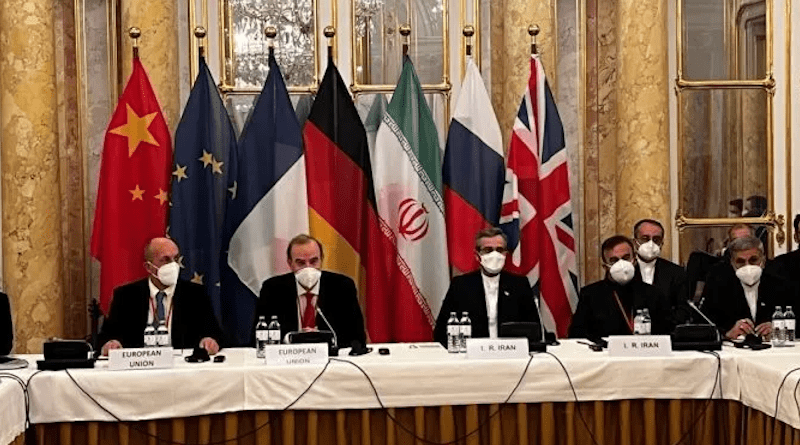Vienna JCPOA Talks Hit Yet Another Deadlock
The Iranian Vienna nuclear talk (JCPOA) saga has become a tasteless pull-and-push game. Meaningless rounds of negotiations, statements of optimism or pessimism, countless photo ops and news conferences, tweets of this authority or that, saying the same things but using different words at different times, and truckloads of rhetoric portray the current state of the Vienna nuclear negotiations.
The secretive nature of Iran’s nuclear development and Iran’s unwillingness to reveal the full scope of its program became one of the world’s most critical security issues, with fears centering on the overwhelming likelihood of Iran’s pursuit of nuclear weapons. Between 2006 and 2015, the United Nations Security Council (UNSC) passed eight resolutions on Iran’s nuclear program, including one in December 2006 imposing sanctions.
Until a few days ago, all the comments and speculations indicated the utmost optimism towards reaching an agreement to revive the already discredited and fragile 2015 JCPOA.
“This is the last millimeter,” said Josep Borrell, the head of the European Union’s foreign policy, the director of the latest round of negotiations.
This hollow and unfounded optimism is reflected in Iran’s media. According to Etemad News, “It seems that the expectations from this round of negotiations are different from the negotiations that took place in the Austrian capital in the last ten months. The atmosphere of optimism that arose after the end of the previous round of consultations has made the positive atmosphere in favor of the agreement even stronger.”
About three weeks ago, the European Union circulated a ‘final text’ for reviving the 2015 JCPOA Iran nuclear deal. This draft was supported by all western countries, and they had hoped it would seek Iran’s approval.
Well, apparently, it did not, and the “yo-yo” negotiations continued.
Iran’s Minister of Foreign Affairs said: “Joseph Borrell has prepared a draft of the views of the different parties of the negotiations and presented it to all parties as a proposal of the European Union coordinator, and we are also reviewing this proposal in the capitals.”
He added, “The Ministry of Foreign Affairs, as the entity in charge of negotiating with sensitivity and care for the rights of the Iranian people, is following the negotiations, and it is important for us that our red lines are fully taken into account in the upcoming agreement. We are serious about reaching a strong, good and stable agreement, and if the American side is realistic and has the necessary flexibility in the possible negotiations ahead, reaching an agreement will not be far from reach.”
After a few days of America’s response to Joseph Borrell’s draft, Iran released its reply. It did not take too long before the US State Department spokesperson Vedant Patel said Iran’s latest input, made Thursday, was “not constructive.” Politico cited a “senior Biden administration official” saying: “Based on their answer, we appear to be moving backwards.”
According to Politico, a politician familiar with the status of the negotiations emphasized that Iran’s response “doesn’t look good at all.” It is not clear how long the parties involved will be willing to continue negotiations, although neither the officials of the Islamic Republic nor the Americans reject diplomacy.
A Biden administration official was asked whether the United States would withdraw from the negotiations in light of Iran’s latest response. He refused to respond.
The possibility of revitalizing the JCPOA is far away, while the meeting of the Agency’s Board of Governors on September 21 in Vienna is supposed to examine, among other things, the remaining safeguard issues between the IAEA and the regime in Tehran. In this regard, analysts’ speculations are now circling around the issue of whether the regime’s case will be referred to the Security Council at the next meeting of the Council of Governors or whether the path to another round of negotiations will be paved. Prolonging the negotiations is a tactic implemented by the Iranian regime to buy time and avoid a decisive decision by western counties, the IAEA, and the United Nations.
The regime in Tehran must make a decision, one way or another, and it seems the time is no more in its favor. It either must comply with the international community’s demands and oblige itself to the terms of a new deal or continue down the path of hostility and confrontation. Considering the social and economic problems the regime is facing inside Iran, both paths will have consequences that will prove to be detrimental to the regime’s authoritarian and brutal rule. Even if a deal or sort of a deal with Iran is reached and we see handshakes and smiles, history tells us that the fabric of the Iranian regime is made from ample strands of lies, deception, and non-transparencies. The international community has been stung by the lies of the regime in the past, many times; allowing it to be stung again is purely foolish.

